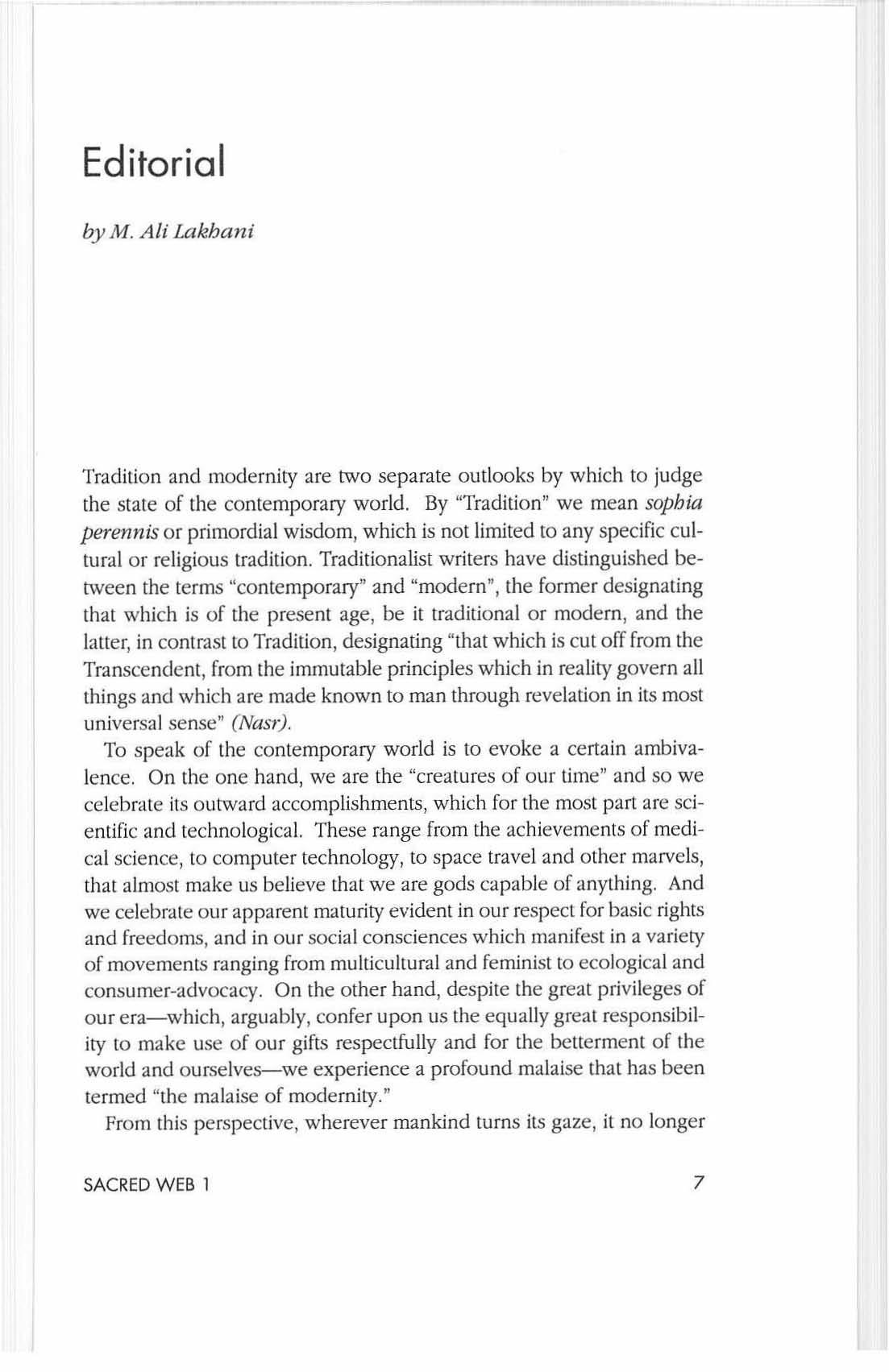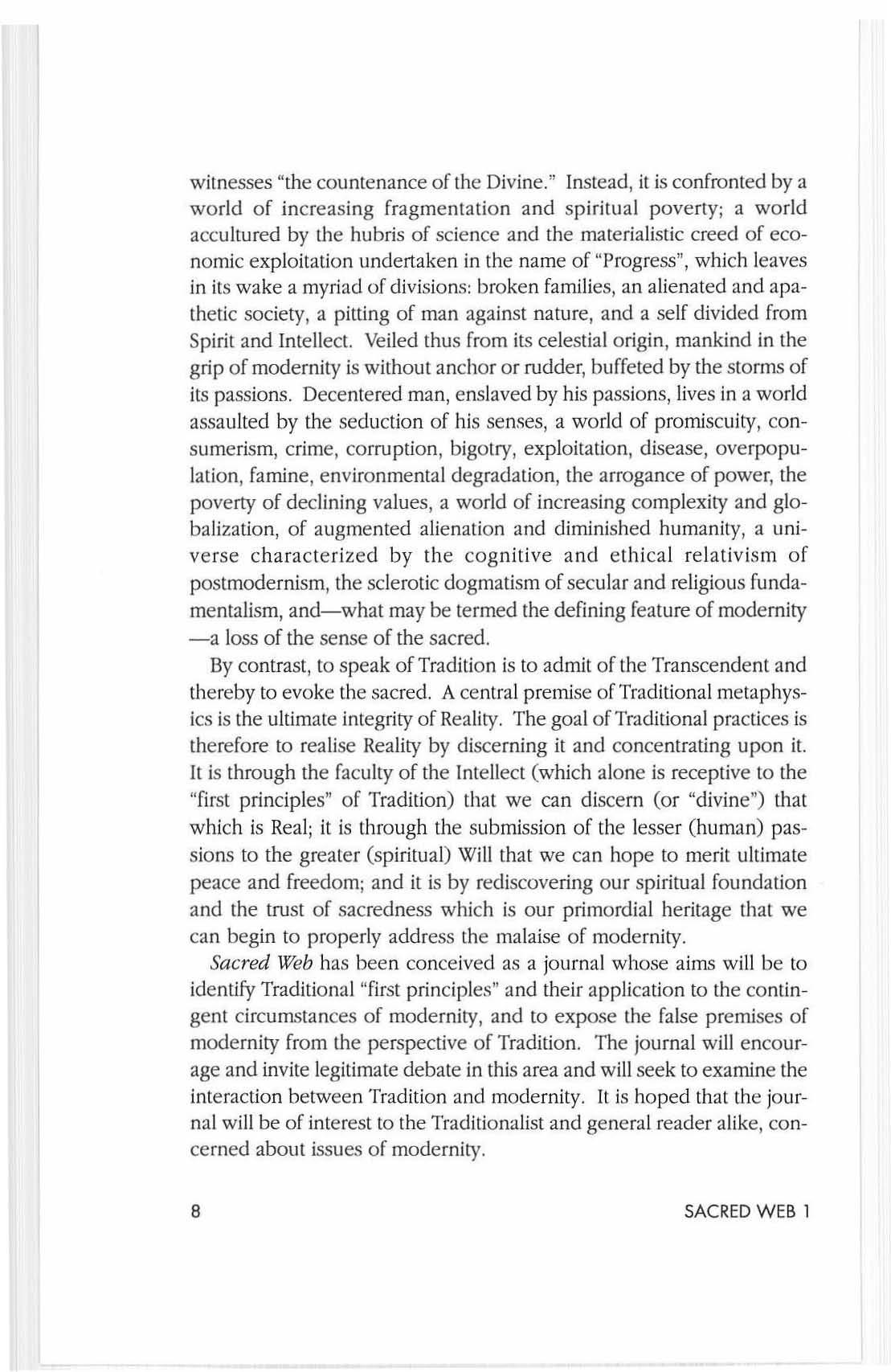
5 minute read
Table of Contents
from Sacred Web 1
Editorial
by M. Ali Lakhal1i
Advertisement
In this introduction 10 "SacrtXI Web", the Editor conLrasts the out looks of Tradition and mod<..-rniIY, and outlines the raison d'etTe of the journal.
The Great Work is the SmaU Work
by Roger Lipsey
In a coO\' ivia l 5('1[in8 beneath an open lea lent not far from Marrakcsh, Dr Lipsey rcO"::C1S upon Ihe objl.'Clivcs of the journal.
Frithjof Schuo" (1907·1998)
by Si.yyed l/osseill Nas r
A tribule by Dr. Nasr 10 one oflhc great expositors of Tradition
Tradition and Modernity
by Flilbjo/Sc/m on
"In the f;ICC of lhe perils o f the modern world , we ask ourselves: What mu st we do? " '!11is pape r was p reviously published under the tiLle "No Activity wilhout Truth ",
Metaphysics Theology and Philosophy
by KellIw/b Oldllleadow
What is meant by "metaphy sks" within TrJdition? Dr. Oldmeadow's lucid analysis from his fonhcorning book on Tradition expl ores this issue by contrasting mctaphysks with theOlogy and philosophy _
On the Pertinence of PhJlosophy
by A"a"da K Coomamswamy
CoomarJs"'amy's essay dis t inguishes between the different meanings of "philosophy', deBm_os the " First Philosophy· of Tr:tditional metaphysil.-s, :lnd considers the problem of -immonality"
Ancient Be liefs or Modern Superstitio ns : The Se arch for Authenticity
by Rmna P. Coo m araswa my
By what criteria can wc discern Tru t h? Arc these cri teria ob jective or subjedive' The author examines the "belief systems " of Tradition and modern ity in this p.1ssionatc plea for recourse to thc "Ancientlc-Jchings" of the great religiOUS lrJditions.
On Earth as it is in Heaven
by james S. Cu tSi nger
This article tackles the ' cvolutionist controversy' and proposcs a basis for the reconciliation of cmanation, creation and evolution. 111C author aims "10 present an account of an cllolving world ' per ascen$unf fully consistent with thc principles presupposed 'per dcsccnsum' by mCI:tphysics and th c ology".
On Revelation , Initiation and Culture
by William n;': Qui ml
To what exlcm is it necessary 10 particiJxuc within a ' Traditionll organilation " for the purposes of spiritual initiltion , and can s uch participa tion even occur within the conditions of modernity? The author examines these issues and contrasts Inc views of Guenon and Coomara!iWamy on this suhject.
Modern Culture and Rislng Entropy
by Robert Bo lr o1/
The scienlific concep t of 'entropy' has parallels in an older a n d u n iversal metaphysical conccpt. In this essay , the author applies that concept to modern cullure In Its various manifestations ranging from the domains of economics and politiCS to art and science, and t he inrli\'iduallife
Editorial
by M. Ali Lakhani
Tradition a nd modernity a re two separate outlooks by which to judge th e s tat e of the conte mporary world. By "Tradition " we mean soph ia perennis o r prim ordial wisdom , wh ich is not limited to any specific c ultura l or religious tradi ti on. Tradi ti onalist w rit ers have di stingui shed betwee n the te rm s "contempo rary" and "modern", t he fo rm er designating thal whi ch is of th e present age, be it traditi o nal o r modern , and the latt e r, in con trast to Tradition , designat ing "that w hi ch is cu t off from th e Transcendent , from the immut a ble principles wh ic h in rea lity govern all things and whic h are made known to man through revelation in it s most uni ve rsa l se nse" (Nasr).
To spea k of the co nt emporary world is to evoke a certa in amb ivale nce. On the one h and, we are the "c reatur es of our lim e" and so we celeb rate it s o utward accom pli shments, whi ch for th e most part are scientific and te chn olog ical. These range from the ac hievement s of medica l scie nce, lO co mputer technology, lO spa ce trav el and ot her marve ls, that almos t make us b e li eve that we are gods cap able of anything. And we ce lebrat e our apparenl maturity ev ident in ou r respect for basic ri ghts an d freedoms , and in our socia l conscie nces w hich manifest in a var iety of movements rang ing fro m mu lt icultura l and feminist to ecologica l and co nsu me rwadvocacy. On the other hand , despite the grea t p rivileges of our era-whic h , arguab ly, co nfer upon us lhe equall y great responsibility to mak e use of our gi ft s respec tfull y and for th e be tt er ment of the world and o urse lves-we ex peri ence a p ro fo u nd malaise that has bee n te rm ed "th e malaise of modernity. n
From thi s per spective, w herever mankind turn s its gaze, it no longe r
SACRED WEB 1 7 witnesses "the coun tenance of the Divine." Instead, it is confronted by a world of increasing fragmentation and spirit ual poverty; a world accultured by the hubris of science and the materialistic creed of economic exploitation undertaken in the name of "Progress", which leaves in it s wake a myriad of divisions: broken families, a n alienated and apathetic society, a pitting of man aga inst nature, and a self divided from Spiril and Intellect. Ve iled thu s from its ce lestial origin, mankind in the grip of modernity is without anchor or rudder, buffeted by the storms of its passions. Decentered man, e nslaved by hi s passions, lives in a world assaulted by th e seduct ion of hi s senses, a world of promi scu ity , consumerism, crime, corruption, bigotry, exploitat ion, disease, overpop ulation, famine , envi ronmen tal degradation, the arrogance of power, the poverty of declining va lu es, a world of increasing comp lexity and globalization, of augmented alienation and dimin ished humanity, a universe charac terized by the cog nitive and ethica l r elat ivism of postmodernism, the sclerotic dogmatism of secular and religious fundamentalism, and-what may be termed the defining feature of modernity -a loss of the sense of the sacred.
By contrast, to speak of Tradition is to admit of the Transcendent and th ereby to evoke the sacred. A centra l premi se of Traditional metaphysics is the ultimate integrity of Reality. The goa l of Traditional practices is therefore to realise Reality by d iscern ing it and concentrating upon it. It is through th e faculty of th e Intellect (whic h alone is recept ive to th e "flrst principles" of Tradition) that we can discern (or "divi ne ") that which is Real; it is through the subm ission of the lesse r (human) passions to the greater (spirit ual ) Will that we can hope to merit ultimate peace an d freedom; and it is by rediscovering our sp iritual foundation and the trust of sac redness which is our primordial herit age tha t we can begin to prop erly address the malaise of modernity.
Sacred Web h as been conceived as a journal whose aims will b e to id entify Traditi onal "first principles" and their application to the cont ingent circumstances of modernity, and to expose the false premises o f modernity from the perspective of Tradition. The journal w ill encourage and invite legitimate debate in this area and will seek to examine the interaction b etween Tradition and modernity. It is hoped th at the journal w ill be of interest to the Tradilionalist and gene ral reader alike, concerned about issues of modernity.










